A leaked Pentagon memo obtained by the military news outlet Task & Purpose undercut President Donald Trump and Defense Secretary Mark Esper’s claims that a coronavirus vaccine would be widely available by the end of the year.
“We will deliver by the end of this year a vaccine at scale,” Esper declared at a White House news conference last week.
“We are looking to get it by the end of the year if we can — maybe before,” Trump added.
But a Department of Defense memo prepared for Esper by Kenneth Rapuano, the assistant secretary of defense for homeland defense and global security, painted a much different picture.
The department must prepare to operate without a vaccine until “at least the summer of 2021,” according to the memo.
“All indications suggest we will be operating in a globally-persistent COVID-19 environment in the months ahead,” the memo said. “This will likely continue until there is wide-scale immunity, through immunization and some immunity post-recovery from the virus.”
The memo also undercut Trump’s attempts to downplay the possibility of a second wave of infections, which disease experts say is very likely to hit by the end of the year.
“We have a long path ahead, with the real possibility of a resurgence of COVID-19,” the memo says. “Therefore, we must now re-focus our attention on resuming critical missions, increasing levels of activity and making necessary preparations should a significant resurgence of COVID-19 occur later this year.”
The memo predicts that new waves will occur “in clusters” that coincide with the flu season. The memo echoes warnings similar to those in a leaked report by the Centers for Disease Control and Prevention that was shelved by the White House.
Trump has dismissed criticism of the White House response, arguing that the U.S. recording far more coronavirus cases than any other country was a “badge of honor” because “it means our testing is much better.”
A Pentagon spokesperson told Task & Purpose that the memo was outdated, though it did not provide any specifics. The memo was prepared as an update to previous guidance issued by Esper last month. It is unclear if Esper saw it. A defense official told the outlet that the memo had circulated since earlier this month and may still be revised.
A Pentagon spokesperson told the outlet that Esper’s vow to deliver a vaccine by year’s end was just a “goal.”
Dr. Anthony Fauci, the head National Institute of Allergy and Infectious Diseases, which is working with pharmaceutical company Moderna on a leading vaccine trial, predicted at the start of the outbreak that a vaccine would take 12 to 18 months to test and distribute. That view was shared by researchers at the Pentagon.
Fauci told NBC News last month that a vaccine by January may be “doable” if “things fall in the right place.”
“Remember, go back in time, I was saying in January and February that it would be a year to 18 months, so January is a year, so it isn’t that much from what I had originally said,” Fauci said, though he acknowledged the timeline was “aspirational.”
“There’s no guarantee that the vaccine is actually going to be effective,” he added. “You can have everything you think that’s in place, and you don’t induce the kind of immune response that turns out to be protective and durably protective.”
But Dr. Rick Bright, who led vaccine development at the Biomedical Advance Research and Development Authority (BARDA) before he was ousted after clashing with officials, warned Congress last week that the timeline “doesn’t mean an FDA-approved vaccine” will be ready for distribution.
“A lot of optimism is swirling around a 12-to-18-month time frame if everything goes perfectly. We’ve never seen everything go perfectly,” Bright said. “I still think 12 to 18 months is an aggressive schedule, and I think it’s going to take longer than that to do so . . . My concern is if we rush too quickly and consider cutting out critical steps, we may not have a full assessment of the safety of that vaccine. So it’s still going to take some time.”
Indeed, the fastest a vaccine has gone from development to approval is four years and most take much longer.
“Everything would have to go perfect,” Dr. Amesh Adalja, an infectious disease expert and senior scholar at the Johns Hopkins University Center for Health Security, told The New York Times. “Vaccine development doesn’t always go as predicted. There are a lot of hiccups in the production process. We’re going faster than we ever have with a vaccine, but we have to be prepared for things to slow down once we get further along.”


